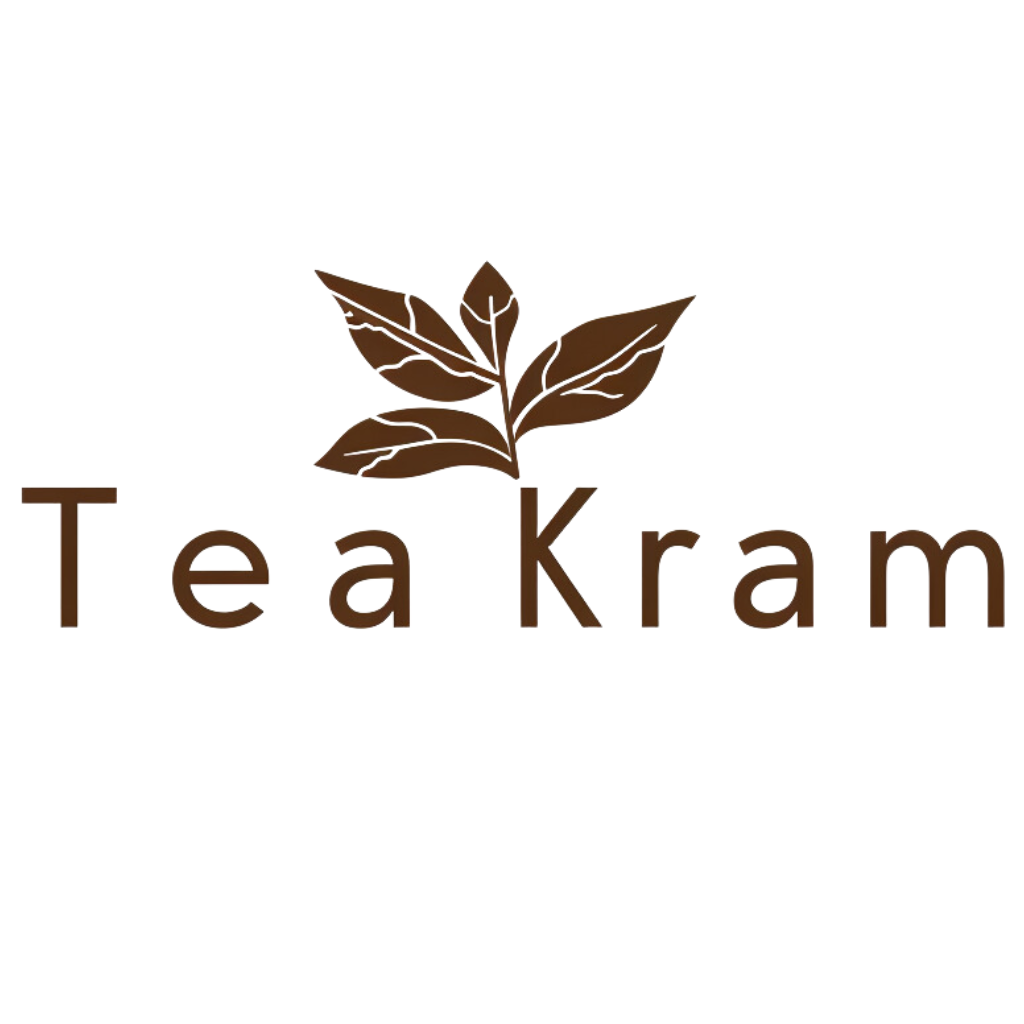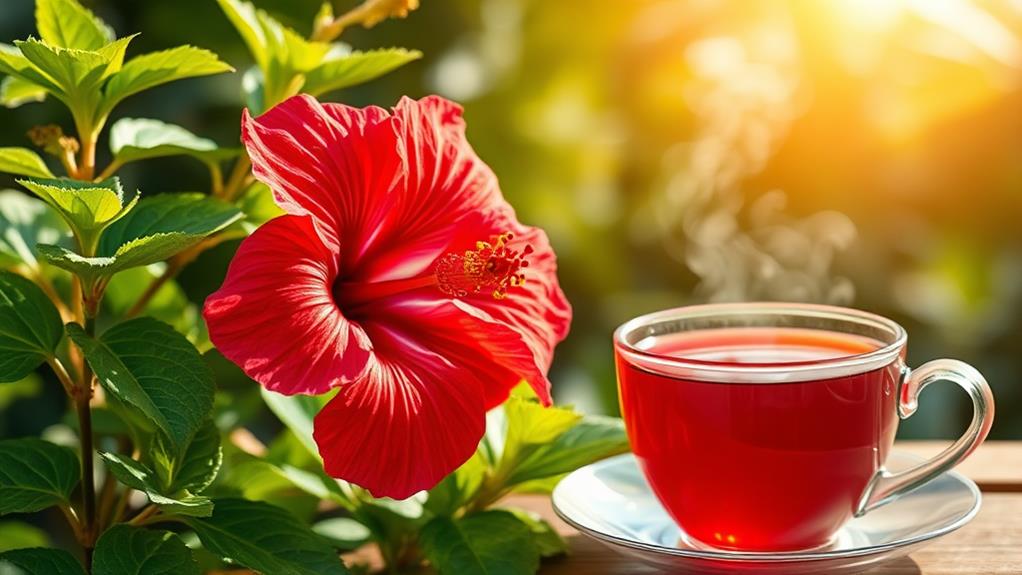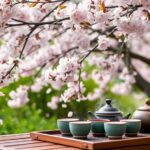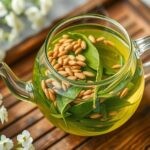You should start drinking more hibiscus tea because it's not only tasty but also super healthy! This vibrant drink is rich in antioxidants, vitamins A and C, and important minerals like calcium. It supports heart health, lowers blood pressure, and even boosts your immune system. Plus, hibiscus can help with digestion and has anti-inflammatory properties. Preparing it is easy—just steep dried petals in hot water and enjoy! You can also spice things up by adding it to smoothies, salads, or sauces. Trust me, there's a lot more to discover about hibiscus and its benefits!
What Is Hibiscus?
Hibiscus is a vibrant flowering plant belonging to the Malvaceae family, with over 200 species found across the globe. You might recognize its bright blooms in gardens or as a popular ingredient in teas. This stunning plant thrives in warm climates, showcasing colors ranging from deep reds to soft pinks. You can easily spot hibiscus in tropical regions, where it adds a splash of color and beauty.
Did you know that hibiscus isn't just a pretty face? It's got a fascinating history, too! Many cultures have used hibiscus for traditional medicine and as an invigorating drink. Its flowers and leaves can be steeped in hot water, creating a tangy, tart brew that's both tasty and revitalizing.
Plus, it's often enjoyed in various culinary dishes, bringing a unique twist to recipes.
Whether you're sipping on hibiscus tea or admiring its gorgeous blooms, you're engaging with a plant that's rich in culture and flavor. So next time you see hibiscus, remember it's not just another flower; it's a vibrant piece of nature that invites you to explore its many benefits! Embrace this innovative plant and discover all it has to offer.
Nutritional Benefits
Known for its striking appearance and rejuvenating taste, hibiscus also packs a nutritional punch. This vibrant flower isn't just a pretty face; it's loaded with essential nutrients that can elevate your daily diet.
For starters, hibiscus is rich in antioxidants, which help combat oxidative stress in your body. These antioxidants play a significant role in keeping your cells healthy and may even support your immune system.
Moreover, hibiscus contains vitamins A and C, both of which are essential for maintaining good vision and skin health. You might be surprised to learn that it's also a source of minerals like calcium and iron, important for bone strength and energy production.
When you sip on hibiscus tea, you're not just enjoying a revitalizing drink; you're also giving your body a boost of nutrients that can enhance your overall wellness.
And let's not forget about its natural tartness! It can be a delightful way to add flavor without extra sugar.
Health Advantages
When you incorporate hibiscus into your diet, you're not just enjoying its vibrant flavor; you're also reaping several health advantages. This beautiful flower does wonders for your body, and you might be surprised at just how beneficial it can be.
For starters, hibiscus tea is known to support heart health. Studies suggest that it can help lower blood pressure, making it a great choice if you're looking to maintain a healthy lifestyle.
But that's not all! Hibiscus is rich in antioxidants, which help fight off free radicals that can harm your cells. Drinking hibiscus tea may also aid digestion and keep your gut happy.
Plus, it's been linked to improved liver health, giving that essential organ a little extra love. If you're looking to boost your immune system, hibiscus can help with that too! Its vitamin C content can give you the support you need to fend off those pesky colds.
How to Prepare Hibiscus Tea
Preparing hibiscus tea starts with choosing the right quality flowers, which can make all the difference in flavor.
Once you've got those vibrant petals, you'll want to use some simple brewing techniques to get the best taste and health benefits.
Don't worry; with a few tips, you'll be sipping on a delicious cup of hibiscus tea in no time!
Choosing Quality Hibiscus Flowers
To brew a delicious cup of hibiscus tea, you need to start with high-quality hibiscus flowers. Choosing the right flowers can make all the difference in flavor and health benefits. Look for deep red, vibrant petals that are dry and fragrant. If they're dull or brittle, you might be getting lower-quality flowers that won't give you that rich, tangy taste you desire.
When shopping, opt for whole dried flowers instead of powdered versions. Whole flowers retain their essential oils and flavors better, ensuring a more aromatic experience. Plus, they're visually stunning when steeped!
Consider buying from reputable sources, like local markets or specialty tea shops, where you can ask questions about the products. Organic options are also a great choice, as they're free from harmful pesticides, giving you a clean brew.
Don't forget to check for freshness; look for packaging with a recent harvest date. By taking these steps in selecting your hibiscus flowers, you'll set the stage for a delightful tea experience that's not just invigorating but also packed with health benefits.
Brewing Techniques and Tips
Brewing a perfect cup of hibiscus tea starts with the right technique. First, choose high-quality dried hibiscus flowers; they're the star of your brew!
Begin by boiling water to around 200°F (just off a rolling boil). While the water heats, measure about 1-2 tablespoons of dried hibiscus petals per cup. This is where you can get creative—feel free to add a slice of ginger or a sprig of mint for an extra kick!
Once your water is ready, pour it over the hibiscus petals in a heatproof container. Let the tea steep for about 5 to 10 minutes, depending on how bold you want your flavor. Don't rush this part; the longer it steeps, the more vibrant the color and taste will be!
After steeping, strain the tea into your favorite cup, and sweeten it as desired. Honey or agave syrup works wonderfully.
If you're feeling adventurous, serve it over ice for a revitalizing summer drink. Experiment with different steeping times and additional flavors to find your perfect balance. Enjoy your innovative hibiscus creation!
Different Varieties of Hibiscus
When you think of hibiscus, you might picture its vibrant flowers, but there are actually many different varieties out there!
Each type offers unique health benefits and flavors that can enhance your tea or culinary creations.
Let's explore some popular hibiscus varieties and discover what makes them special!
Popular Hibiscus Varieties
Hibiscus, with its striking blooms and vibrant colors, offers a variety of species that cater to different tastes and gardening needs. Whether you're looking to brighten your garden or enjoy a revitalizing tea, there's a hibiscus for you. Here are some popular varieties you might consider:
| Variety | Description |
|---|---|
| Hibiscus rosa-sinensis | Known as the Chinese hibiscus, this one thrives in tropical climates and boasts large, showy flowers. |
| Hibiscus sabdariffa | Often called Roselle, it's famous for its tangy flavor and is used to make delicious teas. |
| Hibiscus moscheutos | Also known as the swamp hibiscus, it's perfect for wet areas and features huge blooms in various colors. |
| Hibiscus syriacus | Commonly known as Rose of Sharon, this hardy shrub blooms late and attracts butterflies. |
With such diversity, you can easily find a hibiscus that fits your style. Planting these varieties not only enhances your garden but also adds a tropical feel. So, why not experiment with different types and see which one brightens your space the most?
Health Benefits Overview
Exploring various hibiscus varieties not only enhances your garden but also opens up a world of health benefits. Each type brings unique properties that can boost your well-being in exciting ways.
For instance, Hibiscus sabdariffa, commonly used in teas, is rich in antioxidants. These compounds help fight free radicals in your body, potentially reducing the risk of chronic diseases.
Hibiscus rosa-sinensis, known for its vibrant flowers, isn't just pretty; it's believed to support heart health. Research suggests it can help lower blood pressure, making it a great addition to your diet.
Then there's Hibiscus mutabilis, often utilized in traditional medicine. It's known for its anti-inflammatory properties, which can aid in soothing various ailments.
Adding hibiscus to your daily routine can be as simple as brewing a revitalizing tea or incorporating it into smoothies. With its tangy flavor and health benefits, you'll not only enjoy a delicious drink but also give your body a boost.
Incorporating Hibiscus Into Your Diet
Adding hibiscus to your diet can be a delicious and revitalizing way to boost your health. You can enjoy hibiscus tea, a invigorating drink that's perfect either hot or iced. Try adding dried hibiscus petals to smoothies for a tangy twist. You could even sprinkle some in salads or use them to create vibrant sauces!
Here's a quick guide to some innovative ways to incorporate hibiscus:
| Method | Description | Benefits |
|---|---|---|
| Hibiscus Tea | Brew dried petals in hot water. | Rich in antioxidants and vitamins. |
| Smoothie Booster | Blend petals with fruits and yogurt. | Adds flavor and a nutrient punch. |
| Salad Garnish | Sprinkle dried petals on salads. | Enhances taste and visual appeal. |
These simple additions can transform ordinary dishes into exciting culinary creations. Plus, you'll be reaping the benefits of hibiscus, like improved digestion and heart health. So why not get creative? Experiment with these ideas, and you might just find your new favorite dish! Enjoy the fresh taste and health boost hibiscus brings to your table.
Potential Side Effects
While hibiscus offers numerous health benefits, it's important to be aware of potential side effects.
First off, you might experience a drop in blood pressure when drinking hibiscus tea, especially if you already have low blood pressure. This can leave you feeling lightheaded or dizzy, so keep that in mind!
Additionally, some people may encounter allergic reactions, like skin rashes or itching, particularly if you're sensitive to plants in the mallow family. It's always wise to start with a small amount to see how your body reacts.
If you're pregnant or breastfeeding, you should consult your doctor before diving into hibiscus tea, as its effects aren't fully understood in these cases.
Lastly, hibiscus can interact with certain medications, especially those for high blood pressure and diabetes. If you're on any of these, it's vital to chat with your healthcare provider to guarantee a safe combination.
FAQ
Can Hibiscus Tea Help With Weight Loss?
Hibiscus tea can support your weight loss journey. It boosts metabolism, reduces appetite, and may help lower body fat. By incorporating it into your routine, you might see positive changes while enjoying a revitalizing beverage.
Is Hibiscus Safe for Pregnant Women?
You should consult your healthcare provider about hibiscus during pregnancy. While some studies suggest it's generally safe in moderation, its effects can vary, and it's better to prioritize your and your baby's health above all.
How Does Hibiscus Tea Taste?
Hibiscus tea bursts with a vibrant, tangy flavor that'll make your taste buds dance like they've won the lottery. Its invigorating notes blend sweetness and tartness, creating a uniquely delightful experience you won't want to miss!
Can Hibiscus Interact With Medications?
Yes, hibiscus can interact with medications, particularly those for blood pressure and diabetes. It's essential you consult your healthcare provider before adding it to your routine to avoid any potential complications or unwanted side effects.
Is Hibiscus Tea Caffeine-Free?
While many teas energize you with caffeine, hibiscus tea stands apart. You'll enjoy its vibrant flavor without the jitters. Sip it freely, knowing you can relax and rejuvenate without any caffeine concerns.
Final Thoughts
Incorporating hibiscus into your daily routine is like adding a splash of vibrant color to your health. With its rich flavor and impressive benefits, this delightful tea can be a invigorating companion in your journey towards wellness. Whether you enjoy it hot or cold, the versatility of hibiscus makes it easy to include in your diet. So, why not brew a cup today and sip your way to better health? Your taste buds—and body—will thank you!



